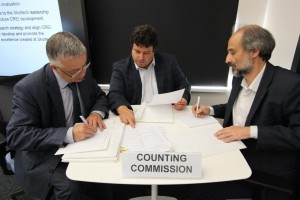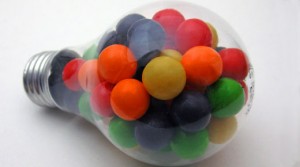“We have waited a long time for this. Now we can actually say that we started to work on our entity”. In these words, Skoltech President Alexander Kuleshov opened the first meeting of the Academic Council that was held in Skoltech’s top-notch CEDL.
 The Academic Council is a new stage in Skoltech development, and a part of an overall change in the management model in accordance with the shared governance principle. The council is a collegial management body performing general governance of educational, research and innovational activities of Skoltech. The Academic Council will have the decision power in the following areas: Research and Innovation: development and approval of general strategy, establishment, reorganization and termination of programs, evaluation of the results of research and innovation activities, and approval of basic terms of Russian and international academic partnerships; Education: determination of the basic principles of education and teaching process, approval of educational programs, and determination of the requirements for applicants and graduates; Faculty: determination of the requirements for faculty and research staff positions, appointment and promotion of faculty.
The Academic Council is a new stage in Skoltech development, and a part of an overall change in the management model in accordance with the shared governance principle. The council is a collegial management body performing general governance of educational, research and innovational activities of Skoltech. The Academic Council will have the decision power in the following areas: Research and Innovation: development and approval of general strategy, establishment, reorganization and termination of programs, evaluation of the results of research and innovation activities, and approval of basic terms of Russian and international academic partnerships; Education: determination of the basic principles of education and teaching process, approval of educational programs, and determination of the requirements for applicants and graduates; Faculty: determination of the requirements for faculty and research staff positions, appointment and promotion of faculty.
The Academic Council is consisted of 19 members, out of which three are administrators – President Alexander Kuleshov, the Provost, Prof. Rupert Gerzer and Alexander Safonov, VP for Academic Relations, who is the academic secretary of the council. Other members are seven professors, who were elected by their colleagues: Iskander Akhatov, Alexei Buchahenko, Boris Fine, Clément Fortin, Ildar Gabitov, Artem Oganov and Keith Stevenson. The remaining nine are external members, prominent scientists, representatives of business and representatives of the Skolkovo Foundation: Jean Botti, Chief Innovation and Strategy Officer at Philips, Alexander Fertman, Director of Nuclear Science and Advanced manufacturing cluster at Skolkovo Foundation, Grigory Kabatyanski, Doctor of Physical and Mathematical Sciences, Andrei Okunkov, the Fields Medal winner, Professor of Mathematics, Columbia University, Pavel Pevzner, Professor of Computer Science and Director of the NIH Center for Computational Mass Spectrometry, University of California, Valeri Rubakov, Doctor of Physical and Mathematical Sciences, Full Member of the Russian Academy of Sciences, Galina Tsirlina, Doctor of Sciences, Lomonosov Moscow State University, Edward Crawley, MIT Professor and Skoltech’s founding President, and Nikolay Kudryavtsev, the rector of the Moscow Physical-Technical Institute.
 The purpose of the first meeting was to officially begin the Council’s work with selecting chairmen for the key committees and discussing the evaluation process of Skoltech’s centers of research, education and innovation (CREIs). The elected committee chairmen are: Clément Fortin, the Dean of Education will be the chairman of the Educational committee, Provost Rupert Gerzer will be the chairman of the Faculty Appointment committee, and Iskander Akhatov will be the chairman of the Committee on research programs and projects (R&I).
The purpose of the first meeting was to officially begin the Council’s work with selecting chairmen for the key committees and discussing the evaluation process of Skoltech’s centers of research, education and innovation (CREIs). The elected committee chairmen are: Clément Fortin, the Dean of Education will be the chairman of the Educational committee, Provost Rupert Gerzer will be the chairman of the Faculty Appointment committee, and Iskander Akhatov will be the chairman of the Committee on research programs and projects (R&I).
The substantial part of the meeting was the discussion about the evaluation process of the CREIs, as presented by the Council member Gregory Kabatiansky. The evaluation process is the beginning of an expert assessment of the functioning of the CREIs. At this stage of Skoltech’s development, it is important to evaluate the preliminary results of the work of the centers in order to plan further a sustainable research development. This project is expected to involve about 100 scientists from the world’s leading research centers. The project also involves leaders of industrial and business communities. According to the results, the experts will present their recommendations to the leadership of the Institute.
*****
The Skolkovo Institute of Science and Technology (Skoltech) is a private graduate research university in Skolkovo, Russia, a suburb of Moscow. Established in 2011 in collaboration with MIT, Skoltech educates global leaders in innovation, advances scientific knowledge, and fosters new technologies to address critical issues facing Russia and the world. Applying international research and educational models, the university integrates the best Russian scientific traditions with twenty-first century entrepreneurship and innovation.: https://www.skoltech.ru/
Контакты:
Skoltech Communications
+7 (495) 280 14 81
